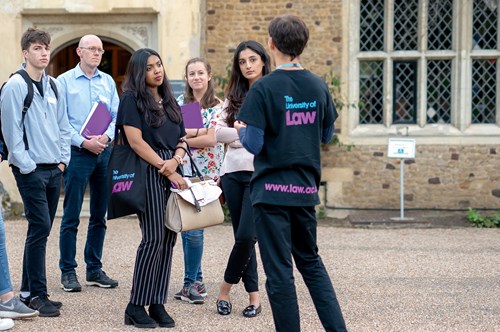We work with many police forces to enable students to know about all their graduate opportunities.
Make an Enquiry

Enquiry form could not be loaded
The BSc (Hons) Professional Policing is a three year undergraduate degree designed to meet the requirements of the College of Policing National Curriculum. This course is licensed by the College of Policing as a Pre-join Degree in Professional Policing, which means it can be your first step towards becoming a Police Constable. During your studies you will learn about key crime topics, as well as have the opportunity to choose elective modules that allow a deeper look at areas of personal interest.


A Level: BBC
BTEC: DMM
UCAS Tariff Points*: 112
GCSE: English Language Grade C/4 or above, or equivalent
Requirements for the Foundation Year differ from those listed.
*From three A Levels or equivalent
Want to speed up your learning? Check out our new Accelerated BSc (Hons) Professional Policing - get a degree in two years rather than the traditional three.
Our degree in Professional Policing will provide you with a professional knowledge of the ethics, skills and attitudes that are critical to twenty-first century policing.
The Professional Policing course has been designed to meet the requirements of the College of Policing National Curriculum for the role of a Police Constable under the National Policing Education Qualifications Framework. We are licensed by the College of Policing to offer the Pre-join Degree in Professional Policing – a qualification recognised by police services that is achieved prior to recruitment.
You will study a range of key topics in the area of crime, criminology, law, terrorism, associated psychology, sociology and criminal investigation. You will also learn through realistic scenarios and the use of a crime scene suite or pop-up facilities* - watch the video. Optional modules will provide an opportunity to look deeper into issues such as forensic and criminal psychology, zemiology (the study of social harms), cybercrime and youth crime.
The undergraduate policing degree will provide you with all of the knowledge required prior to joining the police force and will also be of interest if you are looking to study at Master’s level or work in the wider security and criminal justice sector. Also, as a graduate of the Professional Policing Degree you would be eligable to take part in the PC to Inspector Fast Track programme - you can find more information on the College of Policing website here.
Please note the degree has a currency of 5 years following graduation for recruitment into policing and you must still apply to the police force and satisfy their eligibility criteria. Please contact the Police Service for more information.
Statistics from the 2023 National Student Survey show that 96% of Policing and Criminology students were positive about learning opportunities on their course and 91% were positive about the teaching on their course.
*The video shows the London Bloomsbury crime scene suite. Facilities vary by campus.
You can choose to take an additional Foundation Year before you start your course. This introductory year focuses on developing the key skills required to study at degree level. You will study six modules and on successful completion progress onto any of our three year degrees.
Communication Skills
You will develop communication skills and understanding of different methods and styles of communication. You will consider appropriate methods of communication in both formal and informal environments. You will develop your understanding of social media and how to use it effectively. By looking back at previous activities and considering the choices you made and how you may do things differently in the future, you will enhance your skills on reflection.
Digital and Research Skills
You will learn how to navigate responsibly around the internet using different search engines and resources, including AI, and will develop your understanding of how to stay safe online and create an appropriate online presence. Learn about interpreting information you find; how relevant and accurate it is and how to present it. Discover a variety of learning resources and understand the importance of academic integrity.
Sustainability and Society
You will explore the UN Sustainable Development Goals and how sustainability has a wider impact on society. A problem-solving approach to global sustainability will be adopted and you will be encouraged to think about the role you and others play in addressing sustainability issues and an understanding of who is accountable. Also looking at both the broad concepts of sustainability and the aspects which are relevant to your chosen discipline.
Foundation Year Project
Develop your research skills by learning how to choose, plan and carry out an investigation into a chosen topic. Discover the importance of ethics when conducting research and practice presenting research. This module helps prepare you for entry onto Level 4 of the degree programme through the formative e-portfolio containing a log of activities, your 2000 word written project and your video presentation.
Shaping Skills for Success
This module will enable you to develop wider skills that are needed to succeed during your studies and beyond. You will be introduced to different types of skills and how to track and reflect on your skills development. You will develop your skills by participating in sessions focused on specific skills and hearing from a variety of guest speakers. You will take part in a group challenge designed to develop your teamwork and communication skills and reflect on the skills you develop during this module as part of your Foundation Year Project.
Core Concepts for Criminology and Policing
Introducing you to some of the key concepts, theories and ideas in criminology. You will be encouraged to reflect on some of these concepts, theories and ideas and think critically about some of their implications on the criminal justice system and society more widely. You will also be given the opportunity to develop your research skills and group work in preparation for planning and completing coursework.
Choose one*:
*Options available are indicative and available subject to numbers and the campus chosen. Students will also complete the Shaping Skills for Success programme.
Semester 1
Semester 2
Public Protection: Understanding Abuse & Impact
This Module will introduce you to public protection in a policing context. You will learn about serious offences such as child abuse, female genital mutilation (FGM), domestic abuse (DA), modern slavery, trafficking and honour-based abuse.
Community Policing, Antisocial Behaviour and Introduction to Road Policing
The module introduces community policing. This includes looking at how antisocial behaviour can impact communities and what police powers are available to deal with antisocial behaviour. It also includes the basic offences and police powers for policing the roads.
Information, Intelligence and Digital Policing
We look at issues pertaining to the collection, retention and sharing of information and intelligence and explain the relevant intelligence sources appropriate to policing operations. We will also look at the role of the police in providing crime prevention advice for digital-facilitated crimes.
Response Policing and Police Investigations
We will be looking at the purpose of response policing. This will also include learning about assessing risk, safeguarding, intelligence, use of technology and responding to different environments. We will also further develop our knowledge of powers concerning lawful search and entry, arrest and stop and search. The module also introduces concepts, terminology, principles, powers and legislation that are essential to conducting police investigations.
Custody, Interview and Criminal Justice
Choose one*:
*All options are indicative and subject to availability.
Research Methods/Dissertation (all year - double module)
Students will learn about core research methods and will be planning, researching, and undertaking a substantial independent piece of research in the area of current policing practices.
Responding to Major and Critical Incidents
This module discusses the role and responsibilities of the police at a major incident and examines the effectiveness of joint interoperability between the emergency services.
Supporting those at Risk of Harm & Victims of internet-facilitated crimes
This module looks at the importance of vulnerable people being appropriately supported by the police, and we will learn how to assess how a vulnerable person may respond to a police presence at an incident. We will also look at types of digital-facilitated crimes, identifying individuals who may be especially vulnerable and analysing and evaluating the impact of digital-facilitated crimes on the individual and family.
Semester 2
Dissertation (all year - double module)
Investigating Serious Crime and Understanding Terrorism and Transnational Organised Crime
Students will be provided with an overview of transnational organised crime (TOC) and current academic terrorism research. The second part of the module focuses on the investigative process. We will be discussing homicide investigations and how additional sources of intelligence can be obtained during a complex investigation.
Counter-Terrorism and Advanced Road Policing
The module will provide students with an understanding of key concepts and terminology related to counter-terrorism policing. The process of radicalisation as well as the National Counter-terrorism strategy, key legislation and organisational structure will be explained. The module will also explain the legislation applicable to more complex road investigations. It will highlight the particular policing issues relating to the strategic road network and students will gain knowledge of the key pieces of legislation affecting this area.
Understanding the Police Constable Role and Professional Standards
We look at the history of policing in the UK and how the modern police service was created. We will also cover what it means to be a Police Constable and the structure of the police service (various ranks and departments within the police).
The Criminal Justice System, Key Legislation, Offences & Civil Matters
This module will give an overview of the criminal justice system, the basic principles of criminal liability and an introduction to actus reus, mens rea, strict liability and some statutory defences. It will also include sexual offences, drug offences and offences under the Public Order Act.
Core Principles of Evidence-Based Policing, Information, and Intelligence
Within this module, we will look at the concept of evidence-based policing. Students will discuss the merits as well as potential constraints associated with an evidence-based policing approach.
Introduction to Criminology, Crime Prevention & Key Psychological Concepts
The module will introduce students to core issues, theories, concepts and debates in criminology as well as relevant aspects of psychology. We will also look at crime prevention theories underpinning preventative policing.
Public Protection: Understanding Abuse & Impact
This Module will introduce you to public protection in a policing context. You will learn about serious offences such as child abuse, female genital mutilation (FGM), domestic abuse (DA), modern slavery, trafficking and honour-based abuse.
Community Policing, Antisocial Behaviour, and Introduction to Road Policing
The module introduces community policing. This includes looking at how antisocial behaviour can impact communities and what police powers are available to deal with antisocial behaviour. It also includes the basic offences and police powers for policing the roads.
Information, Intelligence and Digital Policing
We look at issues pertaining to the collection, retention and sharing of information and intelligence and explain the relevant intelligence sources appropriate to policing operations. We will also look at the role of the police in providing crime prevention advice for digital-facilitated crimes.
Response Policing and Police Investigations
We will be looking at the purpose of response policing. This will also include learning about assessing risk, safeguarding, intelligence, use of technology and responding to different environments. We will also further develop our knowledge of powers concerning lawful search and entry, arrest and stop and search. The module also introduces concepts, terminology, principles, powers and legislation that are essential to conducting police investigations.
Forensic and Criminal Psychology
This module will provide students with a deeper insight into some key issues related to Forensic and Criminal Psychology. This will include theories of crime, violent offenders and serial murder, juries and decision-making, effective prison and psychological treatment, and profiling.
Responding to Major and Critical Incidents
This module discusses the role and responsibilities of the police at a major incident and examines the effectiveness of joint interoperability between the emergency services.
Supporting Those at Risk of Harm and Victims of Internet-Facilitated Crimes
This module looks at the importance of vulnerable people being appropriately supported by the police, and we will learn how to assess how a vulnerable person may respond to a police presence at an incident. We will also look at types of digital-facilitated crimes, identifying individuals who may be especially vulnerable and analysing and evaluating the impact of digital-facilitated crimes on the individual and family.
Research Methods and Dissertation
Students will learn about core research methods and will be planning, researching, and undertaking a substantial independent piece of research in the area of current policing practices.
Investigating Serious Crime & Understanding Terrorism and Transnational Organised Crime
Students will be provided with an overview of transnational organised crime (TOC) and current academic terrorism research. The second part of the module focuses on the investigative process. We will be discussing homicide investigations and how additional sources of intelligence can be obtained during a complex investigation.
Counter Terrorism & Advanced Road Policing
The module will provide students with an understanding of key concepts and terminology related to counter-terrorism policing. The process of radicalisation as well as the National Counter-terrorism strategy, key legislation and organisational structure will be explained. The module will also explain the legislation applicable to more complex road investigations. It will highlight the particular policing issues relating to the strategic road network and students will gain knowledge of the key pieces of legislation affecting this area.

To get a full picture of how studying this policing course works during the year, take a look at our course date breakdowns.
Assessments are spread out throughout the duration of the BSc (Hons) Professional Policing course, rather than having lots of exams at the end of the year. This means at the end of each semester, you have a revision/consolidation week followed by two weeks for assessment in each module.
A wide range of assessment methods will be used across all modules to ensure that all programme outcomes can be demonstrated by students. These include unseen essay type exams, Knowledge and Reasoning Exams, Mock Scenarios, Reflective & Critical Essays, Posters, Case Studies.
This variety of approach reflects more closely the practical focus of the programme, and the assessment instruments test more accurately and with greater realism the knowledge, skills and attributes required of students. It also helps to remove barriers to some students who might perform better in different types of assessments.
In each module students will have the benefit of a formative assessment aligned to the methodology of the particular summative assessment. Additional formative assessment of knowledge and understanding will take place through the regular activities within workshops.
You must pass each module to be awarded your degree. A pass mark is 40% and above.
70% 1
60-69% 2.1
50-59% 2.2
40-49% 3
We care about your career, which is why we offer support with job applications and other work experience opportunities as soon as you accept your place.
Discover more
Applications for all our undergraduate courses are open.
2024/25:
UK - £9,250 per year
International (London) - £17,550 per year
International (non-London) - £16,700 per year
If you need to fund your studies with a student loan you can apply via Student Finance.
We have students from over 120 different countries throughout our campuses, with a dedicated team to help international students.